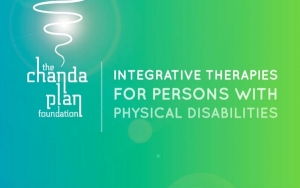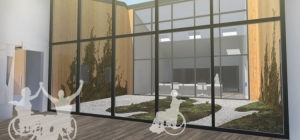The Chanda Plan’s Integrative Therapies for the Disabled
March 24, 2016
Specialized Patient Centered Medical Homes (PCMH) Merge Integrative Care, Primary Care and Mental Health
by John Weeks, Publisher/Editor of The Integrator Blog News and Reports Think orders of magnitude. First, create a plan to bring integrative therapies to people with spinal injuries and other disabilities. Not easy. Talk Medicaid into covering integrative therapies. Rare. Decide this population’s care would be best in a specialized patient centered medical home (PCMH) merging of integrative care, primary care and mental health. Historic. Set a $4-million capital goal for this integrative care PCMH for the disabled and get 72% committed. Wow. Now – if that’s not enough layers of impossible - here’s the kicker. Do it all from a wheel chair due to a bullet in the spine from a childhood accident over 20 years ago. The story here is of Chanda Hinton-Leichtle (pictured right), founder and executive director of the Chanda Plan Foundation. The energetic not-for-profit entrepreneur, now 34, has been a quadriplegic since the age of 9. At 21, she was wasting away at 59 pounds and now credits massage, acupuncture and other integrative therapies for bringing her back from death to being nearly pain free. Her own healing released a passion to bring integrative services to others with long-term disabilities. She was honored in the Integrator Top 10 for Integrative Medicine in 2010.
The story here is of Chanda Hinton-Leichtle (pictured right), founder and executive director of the Chanda Plan Foundation. The energetic not-for-profit entrepreneur, now 34, has been a quadriplegic since the age of 9. At 21, she was wasting away at 59 pounds and now credits massage, acupuncture and other integrative therapies for bringing her back from death to being nearly pain free. Her own healing released a passion to bring integrative services to others with long-term disabilities. She was honored in the Integrator Top 10 for Integrative Medicine in 2010.  Hinton-Leichtle’s original vision was simply to make integrative services available to this population. From 2005-2010, she and her colleagues raised and dispensed over $400,000 for patients. Besides massage and acupuncture, services include chiropractic, cranial sacral, adaptive exercise and adaptive yoga. These services were made available through spot credentialing of practitioners for individuals around the state and country who learned about the Chanda Plan and requested services. Recalls Linton-Leichtle: “They are often just so grateful. Some of them are to the point where they never thought disability and wellness could co-exist. Some of them had given up.” The Medicaid Legislation, Satisfaction and Savings This brief video shared how Hinton-Leichtle used the case of cost-savings in her own care to cold call Medicaid and ask for expanded coverage. In 2009, with the support of a legislative sponsor, Hinton-Leichtle convinced the legislature of the state of Colorado to pass House Bill 09-1047, which mandated the Integrative Medical Therapies (IMT) pilot program. The focus was on individuals with spinal cord injuries. The pilot would last three years and would require outcomes via an external audit. The law came with a small appropriation of just $53,480. Chanda Plan began offering services through a small clinical space. According to the following data shared by the Chanda Plan, the outcomes proved compelling.
Hinton-Leichtle’s original vision was simply to make integrative services available to this population. From 2005-2010, she and her colleagues raised and dispensed over $400,000 for patients. Besides massage and acupuncture, services include chiropractic, cranial sacral, adaptive exercise and adaptive yoga. These services were made available through spot credentialing of practitioners for individuals around the state and country who learned about the Chanda Plan and requested services. Recalls Linton-Leichtle: “They are often just so grateful. Some of them are to the point where they never thought disability and wellness could co-exist. Some of them had given up.” The Medicaid Legislation, Satisfaction and Savings This brief video shared how Hinton-Leichtle used the case of cost-savings in her own care to cold call Medicaid and ask for expanded coverage. In 2009, with the support of a legislative sponsor, Hinton-Leichtle convinced the legislature of the state of Colorado to pass House Bill 09-1047, which mandated the Integrative Medical Therapies (IMT) pilot program. The focus was on individuals with spinal cord injuries. The pilot would last three years and would require outcomes via an external audit. The law came with a small appropriation of just $53,480. Chanda Plan began offering services through a small clinical space. According to the following data shared by the Chanda Plan, the outcomes proved compelling. - Over 75% of individuals receiving these services had a reduction in their self-assessed pain rating, while almost 90% of individuals reported less pain and experienced pain on fewer days.
- 77% of individuals reported an increased range of motion.
- Average ratings from the World Health Organization Quality of Life – BREF instrument showed an increase in all four health domains (Physical, Psychological, Social, and Environmental) for individuals receiving these services.
- 57% of individuals reported a decrease in prescription medication.
- Average pharmacy costs, practitioner care expenses, outpatient service costs, and skilled home health service costs decreased for individuals who received these services for at least one year.
- 100% of individuals receiving these services recommended that others with Spinal Cord Injury (SCI) join this program.
 What if they developed a center for integrative therapies and practitioners to include primary care, nutrition, and mental health? This led Chanda Plan Foundation to its present bodacious plan: start a $4-million capital campaign. The ultimate goal: create a facility that might be useful to the 15,130 people with severe disabilities in the Denver area and a model for the nation. The new 6,000 square foot PCMH (pictured) will house all Chanda Plan services under one roof for better health access, coordination and outcomes with key partners that will co-locate inside the location. The Metro Community Provider Network will offer primary care services with education through a “dynamic rehab doctor” Jeff Berliner, DO, leader of the National Spinal Cord Injury Association. The nearby Craig Hospital is excited to have the focused services available for its rehab clients. Money is coming: the Daniel's Fund has granted $200,000 to help with equipment needs; the Colorado Health Foundation has awarded $500,000 for renovation purposes; and a group of students with the UCLA Executive Master of Public Health in Healthcare Management and Policy, Thomas Armentrout-Wiswall, Kelly Benshoof, and Alicia Macklin are providing free consulting and planning. While the team is still seeking the remainder of needed funds, the doors are expected to open late in 2016. The tempered steel of Hinton-Leichtle’s past advocacy is coming into play as the model develops. “It’s not good enough just to have various services in the building,” she says, “we need to begin this with deep conversation [with our partners] in the integration and collaboration in our medical home” Comment: The redwoods create mystery in a person. Sometimes witnessing a human being can do the same. Awe and wonder, at what reserves one might have had to seek to find in oneself if in a single fluke of time or place one found oneself seriously disabled. For anyone who ever learned to say something like there but for the graces of the gods go I, this promise of the Chanda Plan Foundation is music: “We offer the possibility for disability and wellness to co-exist.” Hinton-Leitchle’s story and presence are quite affecting. Listen to the video. Last year, Colorado Governor John Hickenlooper congratulated The Chanda Plan Foundation on their 10th anniversary of service delivery. Here’s hoping that in another 10 years the model will have been proved, that Medicaid and Medicare will routinely cover integrative services, and the U.S. landscape will be dotted with these model facilities enhancing wellness in tens of thousands of people with long-term disabilities.
What if they developed a center for integrative therapies and practitioners to include primary care, nutrition, and mental health? This led Chanda Plan Foundation to its present bodacious plan: start a $4-million capital campaign. The ultimate goal: create a facility that might be useful to the 15,130 people with severe disabilities in the Denver area and a model for the nation. The new 6,000 square foot PCMH (pictured) will house all Chanda Plan services under one roof for better health access, coordination and outcomes with key partners that will co-locate inside the location. The Metro Community Provider Network will offer primary care services with education through a “dynamic rehab doctor” Jeff Berliner, DO, leader of the National Spinal Cord Injury Association. The nearby Craig Hospital is excited to have the focused services available for its rehab clients. Money is coming: the Daniel's Fund has granted $200,000 to help with equipment needs; the Colorado Health Foundation has awarded $500,000 for renovation purposes; and a group of students with the UCLA Executive Master of Public Health in Healthcare Management and Policy, Thomas Armentrout-Wiswall, Kelly Benshoof, and Alicia Macklin are providing free consulting and planning. While the team is still seeking the remainder of needed funds, the doors are expected to open late in 2016. The tempered steel of Hinton-Leichtle’s past advocacy is coming into play as the model develops. “It’s not good enough just to have various services in the building,” she says, “we need to begin this with deep conversation [with our partners] in the integration and collaboration in our medical home” Comment: The redwoods create mystery in a person. Sometimes witnessing a human being can do the same. Awe and wonder, at what reserves one might have had to seek to find in oneself if in a single fluke of time or place one found oneself seriously disabled. For anyone who ever learned to say something like there but for the graces of the gods go I, this promise of the Chanda Plan Foundation is music: “We offer the possibility for disability and wellness to co-exist.” Hinton-Leitchle’s story and presence are quite affecting. Listen to the video. Last year, Colorado Governor John Hickenlooper congratulated The Chanda Plan Foundation on their 10th anniversary of service delivery. Here’s hoping that in another 10 years the model will have been proved, that Medicaid and Medicare will routinely cover integrative services, and the U.S. landscape will be dotted with these model facilities enhancing wellness in tens of thousands of people with long-term disabilities.



















SHARE